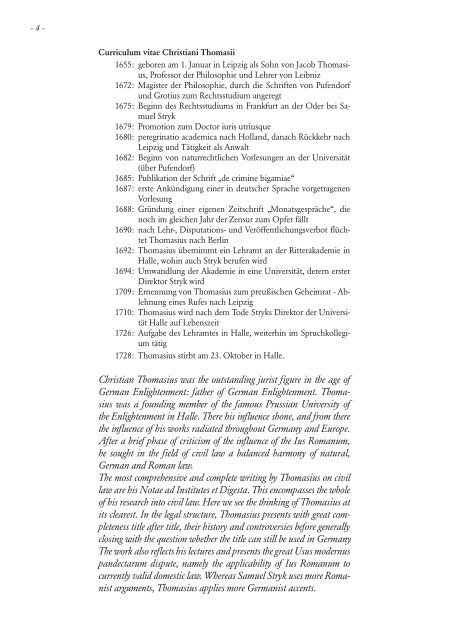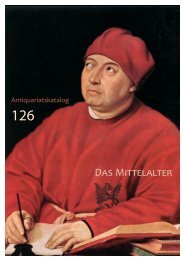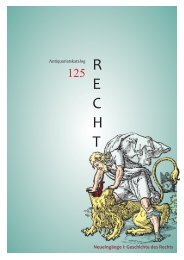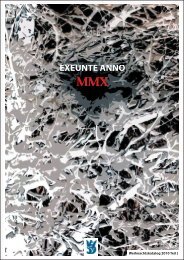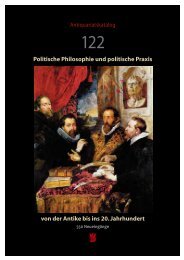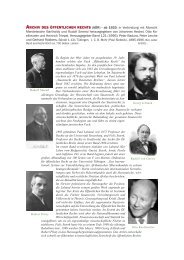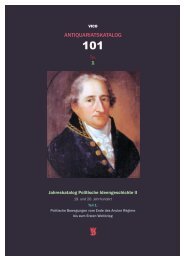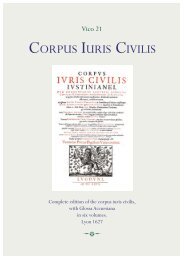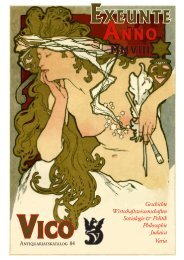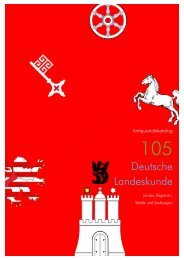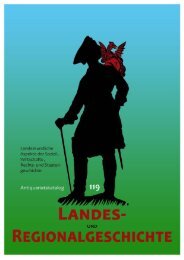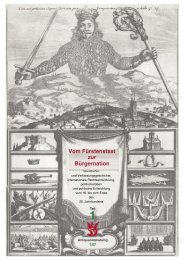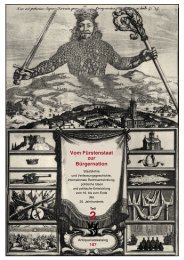christian thomasius - VICO Wissenschaftliches Antiquariat und ...
christian thomasius - VICO Wissenschaftliches Antiquariat und ...
christian thomasius - VICO Wissenschaftliches Antiquariat und ...
Erfolgreiche ePaper selbst erstellen
Machen Sie aus Ihren PDF Publikationen ein blätterbares Flipbook mit unserer einzigartigen Google optimierten e-Paper Software.
- 4 -<br />
Curriculum vitae Christiani Thomasii<br />
1655: geboren am 1. Januar in Leipzig als Sohn von Jacob Thomasius,<br />
Professor der Philosophie <strong>und</strong> Lehrer von Leibniz<br />
1672: Magister der Philosophie, durch die Schriften von Pufendorf<br />
<strong>und</strong> Grotius zum Rechtsstudium angeregt<br />
1675: Beginn des Rechtsstudiums in Frankfurt an der Oder bei Samuel<br />
Stryk<br />
1679: Promotion zum Doctor iuris utriusque<br />
1680: peregrinatio academica nach Holland, danach Rückkehr nach<br />
Leipzig <strong>und</strong> Tätigkeit als Anwalt<br />
1682: Beginn von naturrechtlichen Vorlesungen an der Universität<br />
(über Pufendorf)<br />
1685: Publikation der Schrift „de crimine bigamiae“<br />
1687: erste Ankündigung einer in deutscher Sprache vorgetragenen<br />
Vorlesung<br />
1688: Gründung einer eigenen Zeitschrift „Monatsgespräche“, die<br />
noch im gleichen Jahr der Zensur zum Opfer fällt<br />
1690: nach Lehr-, Disputations- <strong>und</strong> Veröffentlichungsverbot flüchtet<br />
Thomasius nach Berlin<br />
1692: Thomasius übernimmt ein Lehramt an der Ritterakademie in<br />
Halle, wohin auch Stryk berufen wird<br />
1694: Umwandlung der Akademie in eine Universität, derern erster<br />
Direktor Stryk wird<br />
1709: Ernennung von Thomasius zum preußischen Geheimrat - Ablehnung<br />
eines Rufes nach Leipzig<br />
1710: Thomasius wird nach dem Tode Stryks Direktor der Universität<br />
Halle auf Lebenszeit<br />
1726: Aufgabe des Lehramtes in Halle, weiterhin im Spruchkollegium<br />
tätig<br />
1728: Thomasius stirbt am 23. Oktober in Halle.<br />
Christian Thomasius was the outstanding jurist figure in the age of<br />
German Enlightenment: father of German Enlightenment. Thomasius<br />
was a fo<strong>und</strong>ing member of the famous Prussian University of<br />
the Enlightenment in Halle. There his influence shone, and from there<br />
the influence of his works radiated throughout Germany and Europe.<br />
After a brief phase of criticism of the influence of the Ius Romanum,<br />
he sought in the field of civil law a balanced harmony of natural,<br />
German and Roman law.<br />
The most comprehensive and complete writing by Thomasius on civil<br />
law are his Notae ad Institutes et Digesta. This encompasses the whole<br />
of his research into civil law. Here we see the thinking of Thomasius at<br />
its clearest. In the legal structure, Thomasius presents with great completeness<br />
title after title, their history and controversies before generally<br />
closing with . the question whether the title can still be used in Germany<br />
The work also reflects his lectures and presents the great Usus modernus<br />
pandectarum dispute, namely the applicability of Ius Romanum to<br />
currently valid domestic law. Whereas Samuel Stryk uses more Romanist<br />
arguments, Thomasius applies more Germanist accents.


